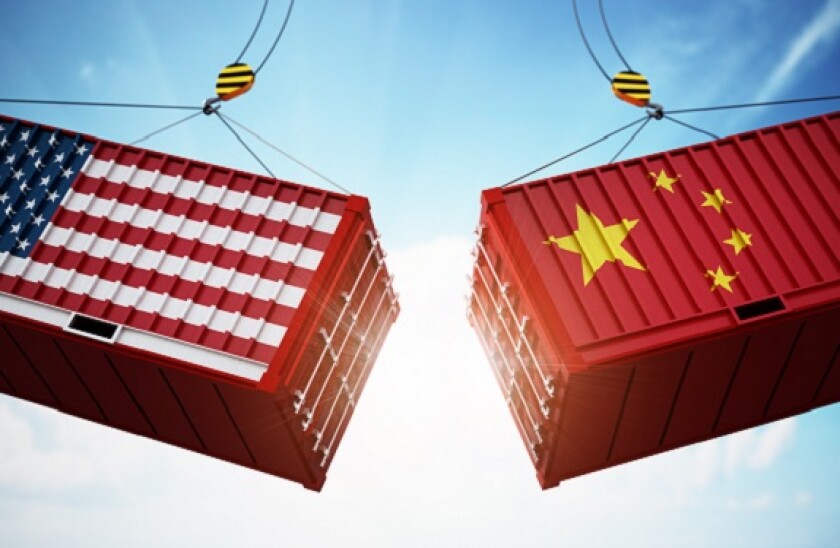China and the US have postponed a video conference to review the phase one trade deal after six months of its implementation, according to Reuters. The review was set to take place on Saturday, but has been delayed to an unspecified date because of scheduling conflicts and the need to allow time for more Chinese purchases of US exports.
*
China’s industrial production (IP) went up by 4.8% year-on-year in July, the same pace as in June, according to data released by the National Bureau of Statistics last Friday.
Retail sales fell 1.1% year-on-year, a slight improvement from the 1.8% year-on-year drop in June. Fixed asset investment increased 8.3% year-on-year, up from the 5.6% growth in June.
“Both IP and retail sales growth were noticeably below market consensus forecasts at 5.1% and 0.1%, respectively,” Ting Lu, chief economist at Nomura, said in a note.
*
The People’s Bank of China (PBoC) has released the 2020 renminbi internationalisation report. The central bank has promised to push forward the opening up of the domestic financial market and improve the connectivity of market infrastructure. It plans to continue easing foreign investment in onshore bonds and stocks, and guide the “healthy development” of the offshore renminbi market.
*
Alibaba Group Holding, Xiaomi Corp and WuXi Biologics will be added to the Hang Seng Index (HSI) after a quarterly index review last Friday. Alibaba and Xiaomi will also be included in the Hang Seng China Enterprises Index (HSCEI), together with Meituan Dianping. The changes will be effective on September 7.
This will be the first time weighted voting right companies and secondary-listed companies are included in the HSI and HSCEI, Si Fu, an associate at Goldman Sachs, said in a Sunday note.
*
The total assets of 51 listed Chinese banks reached Rmb196.5tr by the end of 2019, making up over 82% of the total assets of all commercial lenders, data from the China Banking Association showed.
By July 21, banking institutions in China provided Rmb4.12tr of credit support in the fight against the Covid-19 pandemic.
*
Guo Shuqing, chairman of the China Banking and Insurance Regulatory Commission, published an article in Qiushi, the main theoretical journal by the Communist Party, on Sunday.
Guo warned that the country must guard against a rebound in shadow banking activity and should dispose of non-performing assets in a timely way. He also mentioned the need to open up the financial sector, protect investors and strengthen the leadership of the Communist Party in financial institutions.
*
The PBoC published its July balance sheet on Friday last week. According to the data, its holding in government debt remained steady at Rmb1.52tr by the end of July compared to the previous month, defying market rumours that the central bank had bought government bonds in the secondary market last month.
*
The PBoC has started a larger scale testing of its digital currency, called digital currency electronic payment, the Ministry of Commerce (Mofcom) announced on Friday.
The pilot programme will cover the Beijing-Tianjin-Hubei region, the Yangtze River Delta region, the Greater Bay Area and select cities in the midwest region.
*
The Mofcom also said it will support qualified banks and insurance companies from Hong Kong and Macau to set up branches in 28 Chinese cities and districts that have been classified as trade and services ‘pilot zones’.
*
On Monday, the PBoC rolled over two medium-term lending facilities (MLF) maturing this month. It has kept the interest rate on the new Rmb700bn one-year MLF loans to financial institutions unchanged at 2.95%.
The central bank also conducted Rmb50bn of seven-day repo operations at 2.2%.
*
The China Securities Regulatory Commission (CSRC) issued draft rules on how brokerages should use third-party internet platforms to conduct securities business.
The rules, published last Friday, require securities houses to establish a set of “complete and clear” standards to ensure that their technical security, data privacy and independence of business lines are maintained. Brokerages must also ensure that third-party platform operators do not have access to their clients’ data.
The publication of the draft rules came after some securities houses lowered their risk control standards and loosened data security rules to achieve short-term gains, the regulator said. The rules are open for public opinion until September 15.
*
The Shenzhen Stock Exchange announced that the first batch of companies registered to list on the ChiNext board will start trading on August 24. The bourse did not disclose how many companies will debut on that day. That said, 23 companies have received their IPO registrations from the CSRC and 18 of those had completed their listings on the board by last Friday, filings with the exchange show.
ChiNext is a Nasdaq-style board with a focus on innovative companies and start-ups. The board adopts a registration-based IPO system and does not have a price gain or drop limit for the first five days of trading. After that, stocks are subject to a daily limit up and down of 20%, a step up from the 10% limit on China’s main board.
*
Indebted Chinese bond issuer Brilliance Auto is said to have set up a creditor committee led by seven banks, to ensure there is continuous lending support to the company, according to onshore media 21st Century Business Herald. The Liaoning provincial government-backed automobile manufacturer has sourced enough funds to cover debt payments before March next year, the newspaper reported.
*
China has merged two of the biggest state-owned coal miners in Shandong province. Yankuang Group and Shandong Energy Group, both of which are bond issuers, signed the merger agreement last Friday. The combined company, set to become the country’s second biggest coal producer, will operate as Shandong Energy Group.

